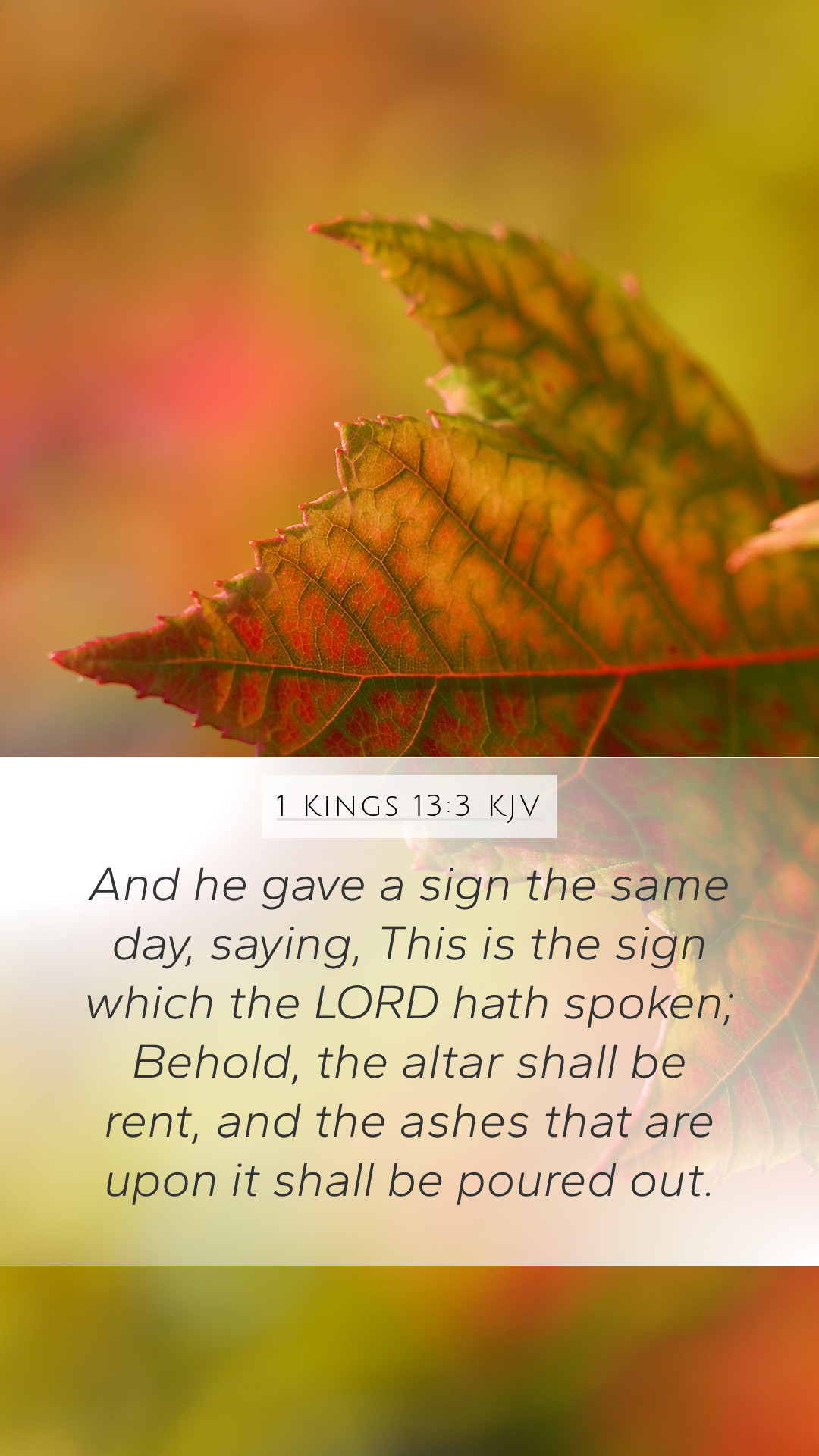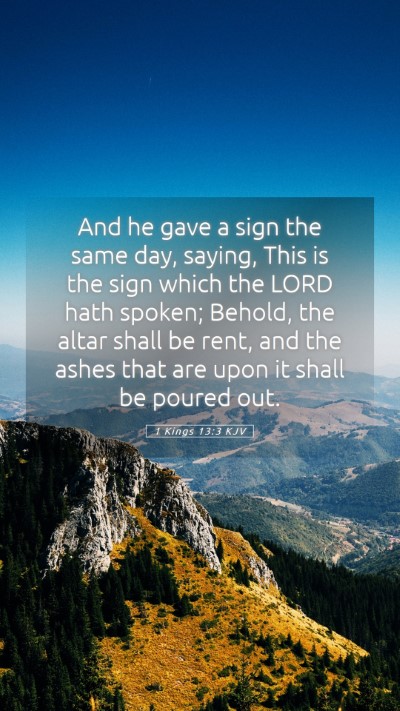Understanding 1 Kings 13:3
This verse states: "And he gave a sign the same day, saying, This is the sign which the Lord hath spoken; Behold, the altar shall be rent, and the ashes that are upon it shall be poured out." To fully grasp this verse, we will draw insights from esteemed Bible commentators, including Matthew Henry, Albert Barnes, and Adam Clarke. Their collective wisdom will help in understanding the implications and significance behind this passage.
Bible Verse Meaning and Commentary
1 Kings 13:3 is a pivotal moment in the narrative of the confrontation between the man of God and King Jeroboam. This event illustrates the theme of divine authority versus human opposition.
- Divine Authority: Matthew Henry emphasizes that the sign given to the man of God demonstrates God's sovereignty. The tearing of the altar signifies God’s disapproval of Jeroboam's idolatrous practices and the false worship established in Israel. This act serves to validate the prophet's message and announce impending judgment on apostasy.
- Fulfillment of Prophecy: Albert Barnes notes that this prophetic act foreshadows the eventual downfall of the false altar—a reality that would come to pass, as evidenced by historical records. The direct action of tearing the altar symbolizes that God will not tolerate any form of worship that deviates from His commandments.
- The Role of Signs: Adam Clarke elaborates on the significance of signs in biblical narratives. He explains that signs serve as confirmations for the faithful and warnings for the unfaithful. Here, the sign is meant to unequivocally establish God’s will and authority over the nation of Israel through tangible evidence.
Key Themes in the Passage
In examining 1 Kings 13:3, several key themes emerge:
- Idolatry and Apostasy: This verse is part of a broader narrative that warns against idolatry—a recurring theme in the Old Testament. Jeroboam's actions represent a severe deviation from the covenant established with Israel, warranting divine intervention.
- Judgment and Grace: The tearing of the altar signifies judgment; however, the presence of the prophet also highlights God's grace, as He sends messengers to call His people back to repentance.
- Miraculous Signs: The miraculous nature of the sign serves to bolster faith among believers and act as a deterrent for those who would oppose God's plan.
Applications and Implications
Understanding the implications of 1 Kings 13:3 can significantly impact the life of a believer today:
- Faithfulness to God: This passage reminds believers of the importance of remaining faithful to God’s commands. It emphasizes the risks associated with deviating from truth.
- Discernment in Worship: The tearing of the altar urges individuals to evaluate their personal and communal worship practices to ensure they align with biblical teachings.
- Importance of Prophetic Voices: In a contemporary context, the passage can encourage believers to heed the words of those who speak truth in the face of popular opinion, reflecting God's insistence on righteousness.
Related Bible Cross References
- 1 Kings 12:28-30: This passage captures Jeroboam’s establishment of alternative worship, leading to the necessity of the prophetic pronouncement in 1 Kings 13.
- Isaiah 44:19: Highlights the futility of idolatry, paralleling the themes of divine disapproval in 1 Kings 13.
- Hebrews 10:31: “It is a fearful thing to fall into the hands of the living God,” reminding readers of the consequences of opposing God’s will.
Conclusion
In summary, 1 Kings 13:3 serves as a vivid reminder of God’s authority and the consequences of straying from His commands. Through the insights from Matthew Henry, Albert Barnes, and Adam Clarke, we grasp the depth of this verse’s message and its applicability to our own lives.
When engaging in Bible study, consider utilizing this verse as a foundation for understanding the implications of faithfulness, prophecy, and God’s unwavering commitment to His covenant people. Such insights provide enhanced Bible verse meanings, Bible verse interpretations, and overall Scripture analysis.


